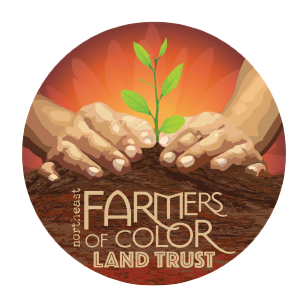Black Land Stewardship Program
The Black Land Stewardship program is a nascent effort that meets farmers and aspiring farmers where they are. Secure land tenure is the goal of Black Land Stewardship, and success requires multiple components. Our interest is to learn the current conditions of the elements needed to ensure that Black farmers in the Northeast thrive so we may restore complete component functionality via advocacy and internal program development.
Contact Email: blacklandstewardship@nefoclandtrust.org
BLACK FARMERS LEARN
The Black Farmers Learn educational subsidy will pay tuition or registration fees of up to $500 for Black farmers or land stewards who wish to expand their knowledge or skills via a self-identified training program. This program honors education from structured sources available to the public; this includes schools, farming institutions, land or agricultural collectives, and conferences or training that offer to deepen skills and increase farming capacity. As these members remain in our community, the knowledge gained will impact others, offering the benefits exponentially. Apply during the first week of every month!
ON THE WAY
“On the Way,” a video-documented helping tour, will build the Black agricultural community and provide education around and implementation of sustainable, regenerative farming practices among Black farmers and aspiring farmers in the northeast region of the United States. This tour will pool the operational needs of Black farms with the knowledge base and educational opportunities of Black farmers, bringing farmers together for skillshares that create and deepen relationships among Black farmers; develop channels for spreading sustainable and regenerative practices; and increase viability for Black farms.
Mutual Roots Fund
The Mutual Roots Fund is the foundational stage of the Northeast Farmers of Color Land Trust (NEFOC) farmer pathway. This program is designed to nurture grassroots relationships, spark ideas, and grow collective momentum within our network of Black, Indigenous, and Brown land stewards.
Each year, NEFOC awards up to $2,000 to NEFOC members who have been active for at least one year. These stipends support joy-centered gatherings that strengthen community ties, deepen collaboration, and inspire shared projects rooted in mutual aid, healing, and liberation.
UNEARTHINGS
Unearthings are opportunities to meet with Black farmers in their states to identify their needs and desires, learn about what has worked well in their communities for the dual purposes of building community with and among them, and inform future Black Land Stewardship programming. These informal gatherings include free and structured conversation over a shared meal.




